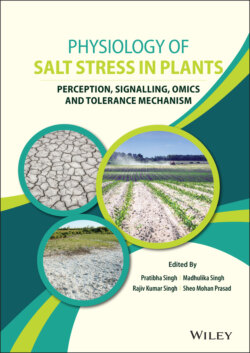Читать книгу Physiology of Salt Stress in Plants - Группа авторов - Страница 36
2.4.2.3 Salt Stress and Oxidative Phosphorylation
ОглавлениеOxidative phosphorylation is the process of ATP production on the mitochondrial membrane by mitochondrial ATP synthase using the electrochemical gradient generated by the mtETC involving protein complexes arranged on the inner membrane of mitochondria. The non‐photosynthetic tissues, like root cells, depend on the mitochondrial oxidative phosphorylation for their energy demand. However, the root cells have limited access to an oxygen supply, have minimal ability to increase the ATP production during stress, and increasing salt ions further suppresses the activity of the complex I and complex II of the mtETC (Jacoby et al. 2011). The negative membrane potential of the mitochondrial membrane assisted the intake of Na+ to the mitochondria (Che‐Othman et al. 2017), of which excess accumulation inhibits the mtETC by denaturing the proteins of the mtETC complexes or by disassembly of the complexes (Flowers 1972). At the moderate or lower salt stress in glycophytes, the ATP synthase activity increased without affecting different subunits of the ATP synthase. However, the ATP synthase subunits decreased significantly at higher salt stresses (Kosova et al. 2013). Due to presence of alternative mtETC pathways like NAD(P)H‐dehydrogenases, and alternative oxidase (AOX), the ETC is more complex and flexible in mitochondria (Jacoby et al. 2011). Suppression or inhibition of the mtETC negatively impacts the oxidative phosphorylation and ATP production. Moreover, the altered mtETC facilitates the electron's leakage to the free oxygen molecule and produces an excess amount of the ROS. However, the ionic component of the salt stress is more deleterious to the mtETC than the osmotic, affecting the NADH dehydrogenase (complex I) and succinate dehydrogenase (complex II) activity (Hamilton and Heckathorn 2001). Two competing respiratory chains in plant mitochondria help plants maintain the mtETC up to some extent in moderate salt stress. When salt stress inhibits the cytochrome‐mediated respiratory chain activity, the AOX‐mediated chain remains unaffected (Jacoby et al. 2011) and provides metabolic adjustment to the mitochondria at low or moderate salt stress.
